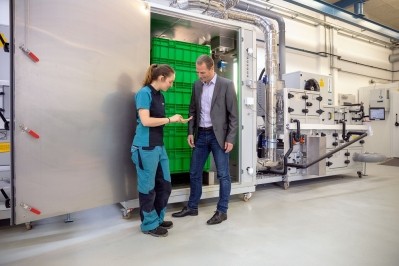Reports from VICTAM 2019, Cologne
DSM and Bühler look at additive stability during feed processing
Susanne Steghöfer, animal nutritionist, feed business unit, Bühler, presented on the findings of a study carried out by her and Laure Clasadonte, feed technology and formulation manager, DSM, during the first International Feed Technology Congress (IFTC) at VICTAM 2019 in Cologne last week.
FeedNavigator caught up with Steghöfer after her talk.
“We face quite a challenge in feed production nowadays because we want to produce safe feed and [linked to this] are increasing conditioning temperatures as well as retention times. Feed additives can be degraded [by such process conditions].”
Their study looked to evaluate the impact of temperature and retention time on additive stability during feed hygienization; they also looked to assess the influence of the set-temperature of heating mats around the retentioner on product temperature.
“The objective was to assess how the product behaves during these [longer retention times] but also [to see] how can we improve our processes so we can [both ensure a certain] temperature but also product quality.”
Methodology
They used a Bühler pilot scale unit to provide the controlled conditional temperature and a retentioner to test recovery of additives such as enzymes and vitamins in a corn-soy broiler diet after pelleting.
They examined the effects of temperature, residence time and their combination on the stability of the additives. They took three feed samples per batch after the pelletizer, cooled them in ambient air and then analyzed them in duplicate. The pilot scale retentioner was jacketed with heating mats and was equipped with seven additional temperature sensors so that various heat treatments could be tested. The product temperature along the retentioner was also evaluated.
Findings
The additive stability analysis showed a lot of variability, with product type playing a role in the outcome.
They observed that some products were highly effected by heat, while others not at all. They did not see any impact from retention time on the specific products they tested, with temperature proving to be the critical parameter.
“We had one vitamin C product and one xylanase product that were affected by the heat. It really depends on the structure of the product but also on the formulation. You cannot now say each xylanase will behave like this. It was this specific product, but what we learnt was that temperature plays a crucial role.
“We see that [industry] is really concerned about Salmonella and [feed millers] often over-compensate [in that respect] by going really high with conditioning temperatures and we see that this is a problem in terms of the stability of feed additives.
“So our goal, from a process perspective, is to maintain the temperature of the whole retention time so you can be sure when you say you want to have 80°C you have 80°C at the end, and we do that by adjusting the heating mat temperature.”
They evaluated the effect of the different settings of the heating mat temperature on the final product.
“Our recommendation, with our equipment, is to set the temperature of the heating mats at 10°C above the conditioning temperature to ensure you have the target temperature you want.”
















